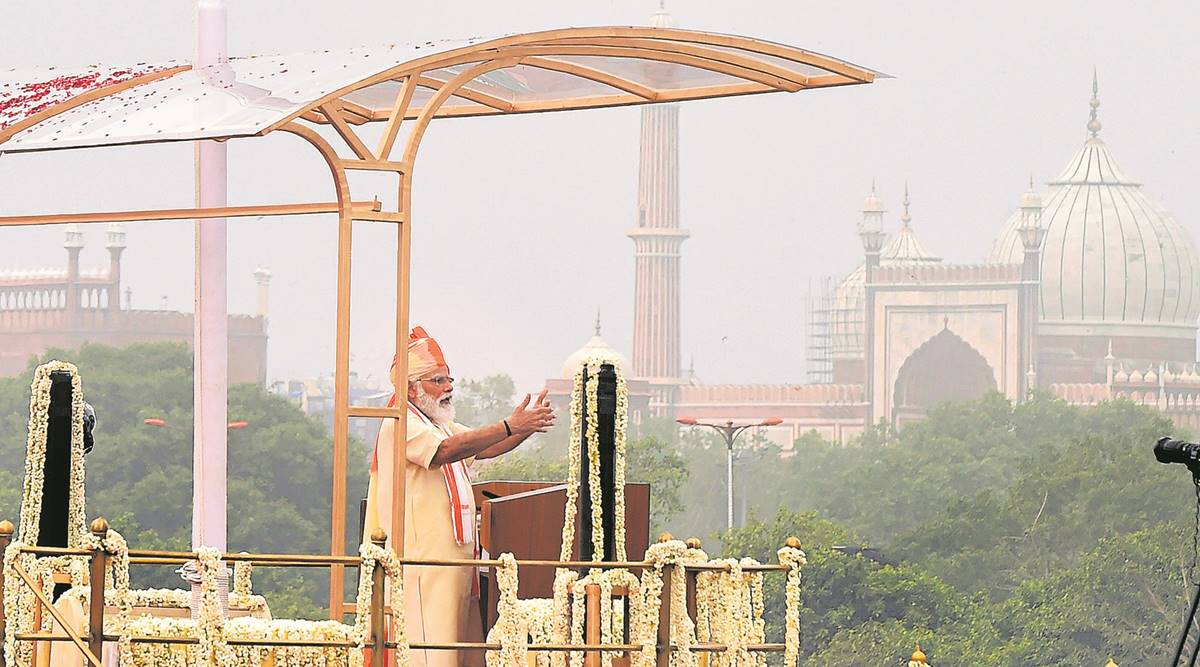 Prime Minister Narendra Modi addresses the nation from the ramparts of the Red Fort on Saturday. (Source: PTI)
Prime Minister Narendra Modi addresses the nation from the ramparts of the Red Fort on Saturday. (Source: PTI)Underlining that “the biggest lesson of self-reliance (atmanirbharta ki sabse badi seekh) has been taught to us by the health sector” following the Covid-19 outbreak, Prime Minister Narendra Modi announced Saturday the launch of the National Digital Health Mission under which “every Indian will be given a health ID”.
Addressing the nation from the ramparts of the Red Fort on Independence Day, the Prime Minister, who devoted a major part of his speech to Atmanirbhar Bharat, “a mantra for 130 crore” Indians, said the National Digital Health Mission “will bring a new revolution” in the health sector and “technology will be used prudently to reduce the challenges in treatment”.
“Every Indian will be given a health ID. This health ID will work like a health account of every Indian. This account will contain details of your every test, every disease, the doctors you visited, the medicines you took and the diagnosis. When and what was the report, all such information will be incorporated in the health ID,” he said.
“The National Digital Health Mission will eliminate all difficulties related to appointments with a doctor, depositing money, making a slip at the hospital, etc. We are devising a system which will help each and every citizen to make a better and informed decision,” he said.
This was one of the key takeaways from the speech of the Prime Minister who spoke at length on the situation arising out of the pandemic, the response of the Army to threats “from the LoC to the LAC”, one year of the end of Article 370 in Jammu and Kashmir and the delimitation exercise there for early elections, and the Ram temple construction in Ayodhya. He also highlighted his government’s thrust on infrastructure, agriculture, piped-water supply, empowerment of women, optical fibre connectivity to 6 lakh villages in 1,000 days, and a new cyber security policy.
Welcoming the Prime Minister’s “historic announcement” of the launch of the National Digital Health Mission, Dr Harsh Vardhan, Union Minister of Health & Family Welfare, said the Mission “aims to create a national digital health ecosystem leveraging advanced information technology and innovation in data and health systems”.
“I am pleased to share with you that the mission will be launched on pilot mode in the six Union Territories of Chandigarh, Ladakh, Dadra and Nagar Haveli and Daman and Diu, Puducherry, Andaman & Nicobar Islands and Lakshadweep,” he said.
“Based on the initial learnings in the UTs, we will gradually work in partnership with the states to launch the NDHM. I seek the whole-hearted support, inputs and cooperation of doctors, healthcare facilities, citizens and the state governments to adopt this game-changing scheme,” he said.
Dr Indu Bhushan, Chief Executive Officer, National Health Authority, said, “The core building blocks of NDHM such as Health ID, Digi-Doctor and Health Facility Registry shall be owned, operated and maintained by the Government of India. Private stakeholders will have an equal opportunity to integrate with these building blocks and create their own products for the market. However, core activities and verifications, for example, generation of Health ID or approval of a doctor/facility shall remain with the Government.”
“Additional components, like Personal Health Record (PHR) and Electronic Medical Record (EMR) solutions can be developed by private players as well, in line with guidelines that will be issued. All such products by private participants shall be as per official guidelines taking care of security, privacy and standards of the NDHM ecosystem,” he said.
The genesis of the new digital health infrastructure came about in the 2017 National Health Policy, which proposed a new National Digital Health Authority. Then, a committee headed by former UIDAI chairman J Satyanarayana released the National Digital Health Blueprint in July 2019.
This August 7, the National Digital Health Mission (NDHM) released the latest strategic document, outlining the envisioned digital personal health records, digital clinical decision systems, and digital registries of doctors, hospitals, pharmacies, and insurance companies,
Patients can create a Health ID, allowing them to virtually share files between hospitals and doctors. They can choose for how long or what specific documents they would like to share with whom. If individuals are looking to benefit from government schemes, then they will be required to connect their ID to the Aadhaar.
One copy of a patient’s records will be stored in the doctor’s file and another in one’s individual locker. Other than the registry of doctors, professionals, and institutions, this allows for decentralised storing.
In early July, the NDHM began a series of consultations with major hospitals, insurance companies, licensing authorities, and laboratories.